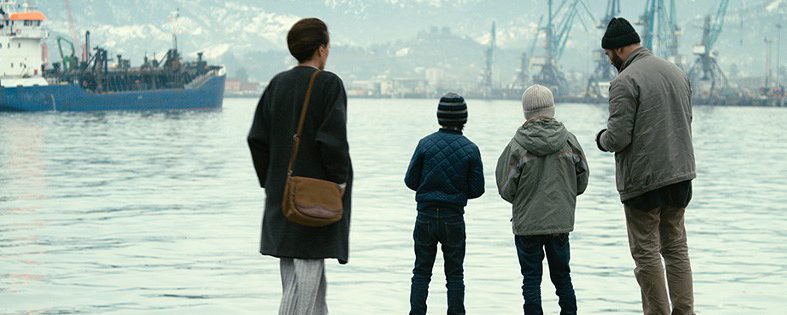
The sensitive Georgian drama Horizon (Horizonti) is about a man who loves too much. A talented Tbilisi designer, Giorgi is a deeply decent guy – he just can’t let go of his ex, Ana. The kids are living with her, and they have an amiable relationship, but Giorgi yearns to rekindle their romance. She’s not into reunification, but she doesn’t freak out when Giorgi lets himself in her apartment unannounced or when he delivers an unwanted nuzzle on her neck. She’s open about her new boyfriend, but Giorgi isn’t internalizing the cues.
Giorgi moves to a lakeside cabin out in the boondocks. He is a city guy, and this is an environment where there isn’t anything to do except to hunt, fish and chase the chickens back into their pen. Is he there to escape from the emotional pain? Or to keep his own behavior under control? He makes friends with two elderly residents, their housekeeper and a neighboring guy his age with whom he shares no interests.
Will Giorgi’s isolation cure his heartbreak?
Horizon is the second feature for female writer-director Tinatin Kajrishvili. The screenplay is devoid of the heavy-handedness that plagues many films on this subject. Ana is filled with ambivalence; she really cares for Giorgi – she is deeply fond of him, she just wants to be married to someone else. At one point, Giorgi behaves poorly, but it doesn’t define him as a stalker or a harasser; he is not motivated by the need to dominate and control, just the yearning to be with the partner he adores.
Near the end of the film, one character tells a blatant falsehood that is startling to the audience; this lie is a remarkably generous one because it relieves a grief-stricken character of what could have become life-paralyzing guilt.
Giorgi Bochorishvili is excellent as Giorgi, and Ia Sukhitashvili is even better in the supporting role of Ana.
Cinequest hosts the US premiere of Horizon.

